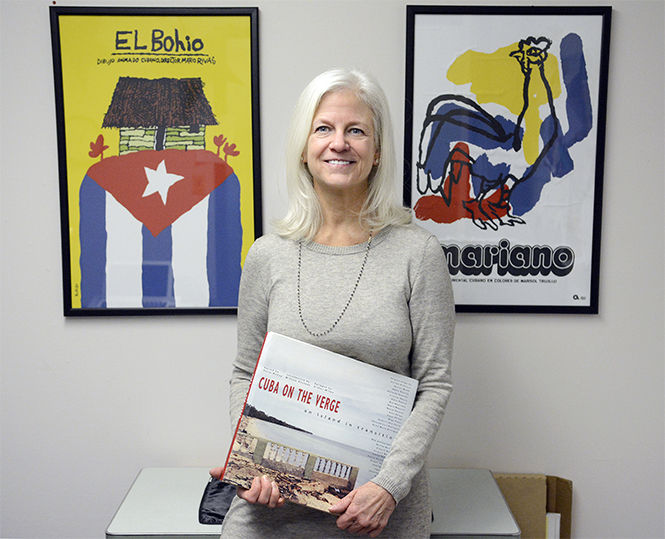Kent State professor, board chair see Cuba as educational opportunity
Anne Morrison, professor of Lifespan Development and Education Sciences, stands in front of posters for Cuban films “El Bohio” (1984) and “Mariano” (1981) in her White Hall office Wednesday, Jan. 21, 2015.
January 21, 2015
With the changing relationship between the United States and Cuba, a Kent State professor believes improving interactions with the island nation could be educationally beneficial on both sides.
“Our students could very much benefit from going to Cuba and getting the sense of this culturized country that has gone through a lot,” said Anne Morrison, professor in the College of Education, Health and Human Services who visits Cuba several times each year to study the education system.
On Jan. 15, President Barack Obama discussed his views on how the relationship with Cuba could be improved in a speech. One of these changes includes lifting the economic embargo, or ban, which would benefit both the U.S. and Cuban economy.
“I think President Obama has taken a large step to normalizing relations between two countries,” Morrison said.
Obama said he also plans to lessen the restrictions on travel to make it easier for Cuban Americans to visit their relatives in Cuba.
“What’s changing is we’re not preventing our own citizens from Cuban goods like we have before,” said Julie Mazzei, associate professor for political science. “What’s primarily going to change is American access.”
An educational opportunity opens up with the changing relationship.
Mazzei said Cuba has an exceptional education system with high standards for students.
“It’s a really interesting country,” said Nancy Drain, an educator at Twinsburg High School and Kent State alumna. Drain went to Cuba with Morrison when she was a student at Kent State.
“There’s such an interest of culture in music and arts,” Drain said. “Having the opportunity to have more of a relationship with the U.S. and Cuba is a really positive thing.”
The Cuban Literacy Campaign in 1961 worked to raise the literacy rate across the country. Before the revolution, the literacy rate averaged at 70 percent. The literacy rate now is 99.8 percent, Drain said.
After the revolution, Cuban schools closed and those who could read taught other citizens literacy in an effort to improve the literacy rate, Morrison said.
“The revolution in the ‘60s eradicated the literacy rate,” she said. “It got rid of people who couldn’t read or write in one year.”
Creating an open relationship with Cuban society, Drain said, can benefit students in America through its “cultured society.”
Dennis Eckart, chairman of the Board of Trustees, said he hopes to build the relationship with Cuba and Kent State as an educational opportunity.
“The fact that Kent State has a presence in Cuba for several years will give us a head start on education opportunities for students both at Kent and in Cuba,” Eckart said. “We hope to take advantage of the travel limitations and build on some of the earlier work that Kent State has already done.”
Students from Kent State have the opportunity to travel to Cuba in March and June of this year with Morrison. Anyone who wishes to visit Cuba and explore the opportunities the Cuban society can offer students can contact Morrison directly at [email protected].
Contact Samantha Ickes at [email protected].

























